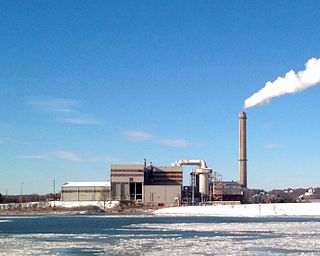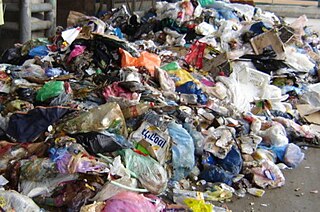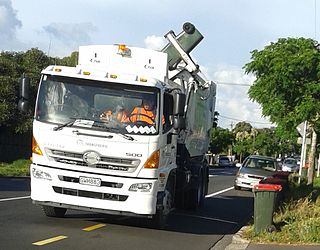
Hazardous waste is waste that must be handled properly to avoid damaging human health or the environment. Waste can be hazardous because it is toxic, reacts violently with other chemicals, or is corrosive, among other traits. As of 2022, humanity produces 300-500 metric tons of hazardous waste annually. Some common examples are electronics, batteries, and paints. An important aspect of managing hazardous waste is safe disposal. Hazardous waste can be stored in hazardous waste landfills, burned, or recycled into something new. Managing hazardous waste is important to achieve worldwide sustainability. Hazardous waste is regulated on national scale by national governments as well as on an international scale by the United Nations (UN) and international treaties.

Waste management or waste disposal includes the processes and actions required to manage waste from its inception to its final disposal. This includes the collection, transport, treatment, and disposal of waste, together with monitoring and regulation of the waste management process and waste-related laws, technologies, and economic mechanisms.

The Resource Conservation and Recovery Act (RCRA), enacted in 1976, is the principal federal law in the United States governing the disposal of solid waste and hazardous waste.

Zero waste, or waste minimization, is a set of principles focused on waste prevention that encourages redesigning resource life cycles so that all products are repurposed and/or reused. The goal of the movement is to avoid sending trash to landfills, incinerators, oceans, or any other part of the environment. Currently 9% of global plastic is recycled. In a zero waste system, all materials are reused until the optimum level of consumption is reached.

A waste-to-energy plant is a waste management facility that combusts wastes to produce electricity. This type of power plant is sometimes called a trash-to-energy, municipal waste incineration, energy recovery, or resource recovery plant.
Articles related to waste management include:

Municipal solid waste (MSW), commonly known as trash or garbage in the United States and rubbish in Britain, is a waste type consisting of everyday items that are discarded by the public. "Garbage" can also refer specifically to food waste, as in a garbage disposal; the two are sometimes collected separately. In the European Union, the semantic definition is 'mixed municipal waste,' given waste code 20 03 01 in the European Waste Catalog. Although the waste may originate from a number of sources that has nothing to do with a municipality, the traditional role of municipalities in collecting and managing these kinds of waste have produced the particular etymology 'municipal.'

The Singapore Green Plan (SGP) was created in 1992 to ensure that the economic growth model of Singapore does not compromise the environment. The SGP sets out the strategies, programs and targets for Singapore to maintain a quality living environment while pursuing economic prosperity. The focus areas in the SGP are led by a main coordinating committee and respective action program committees. Since 1992, the SGP has been continuously updated to ensure its relevance, releasing SGP 2012 in 2002 and SGP 2030 in 2021. The United Nations (UN) Sustainable Development Goals (SDG) are correlated or mapped to the SGP.

National Environment Agency (NEA) is a statutory board under the Ministry of Sustainability and the Environment of the Government of Singapore.

Construction waste is any kind of debris from the construction process. Different government agencies have clear definitions. For example, the United States Environmental Protection Agency EPA defines construction and demolition materials as “debris generated during the construction, renovation and demolition of buildings, roads, and bridges.” Additionally, the EPA has categorized Construction and Demolition (C&D) waste into three categories: non-dangerous, hazardous, and semi-hazardous.
Waste management in Japan today emphasizes not just the efficient and sanitary collection of waste, but also reduction in waste produced and recycling of waste when possible. This has been influenced by its history, particularly periods of significant economic expansion, as well as its geography as a mountainous country with limited space for landfills. Important forms of waste disposal include incineration, recycling and, to a smaller extent, landfills and land reclamation. Although Japan has made progress since the 1990s in reducing waste produced and encouraging recycling, there is still further progress to be made in reducing reliance on incinerators and the garbage sent to landfills. Challenges also exist in the processing of electronic waste and debris left after natural disasters.

Waste are unwanted or unusable materials. Waste is any substance discarded after primary use, or is worthless, defective and of no use. A by-product, by contrast is a joint product of relatively minor economic value. A waste product may become a by-product, joint product or resource through an invention that raises a waste product's value above zero.

The management of waste in New Zealand has become more regulated to reduce associated environmental issues. According to OECD data, New Zealand is the third most wasteful country in the OECD.

Electronic waste is a significant part of today's global, post-consumer waste stream. Efforts are being made to recycle and reduce this waste.

Waste management laws govern the transport, treatment, storage, and disposal of all manner of waste, including municipal solid waste, hazardous waste, and nuclear waste, among many other types. Waste laws are generally designed to minimize or eliminate the uncontrolled dispersal of waste materials into the environment in a manner that may cause ecological or biological harm, and include laws designed to reduce the generation of waste and promote or mandate waste recycling. Regulatory efforts include identifying and categorizing waste types and mandating transport, treatment, storage, and disposal practices.
Solid waste policy in the United States is aimed at developing and implementing proper mechanisms to effectively manage solid waste. For solid waste policy to be effective, inputs should come from stakeholders, including citizens, businesses, community-based organizations, non-governmental organizations, government agencies, universities, and other research organizations. These inputs form the basis of policy frameworks that influence solid waste management decisions. In the United States, the Environmental Protection Agency (EPA) regulates household, industrial, manufacturing, and commercial solid and hazardous wastes under the 1976 Resource Conservation and Recovery Act (RCRA). Effective solid waste management is a cooperative effort involving federal, state, regional, and local entities. Thus, the RCRA's Solid Waste program section D encourages the environmental departments of each state to develop comprehensive plans to manage nonhazardous industrial and municipal solid waste.
Waste management in Russia refers to the legislation, actions and processes pertaining to the management of the various waste types encountered throughout the Russian Federation. The basis of legal governance for waste management in Russia at the federal level is outlined through Federal Law No. 89-FZ, which defines waste as “the remains of raw materials, materials, semi-finished products, other articles or products that have been formed in the process of production or consumption as well as the goods (products) that have lost their consumer properties”.
Turkey generates about 30 million tons of solid municipal waste per year; the annual amount of waste generated per capita amounts to about 400 kilograms. According to Waste Atlas, Turkey's waste collection coverage rate is 77%, whereas its unsound waste disposal rate is 69%. While the country has a strong legal framework in terms of laying down common provisions for waste management, the implementation process has been considered slow since the beginning of 1990s.

Waste management in Australia started to be implemented as a modern system by the second half of the 19th century, with its progresses driven by technological and sanitary advances. It is currently regulated at both federal and state level. The Commonwealth's Department of the Environment and Energy is responsible for the national legislative framework.














